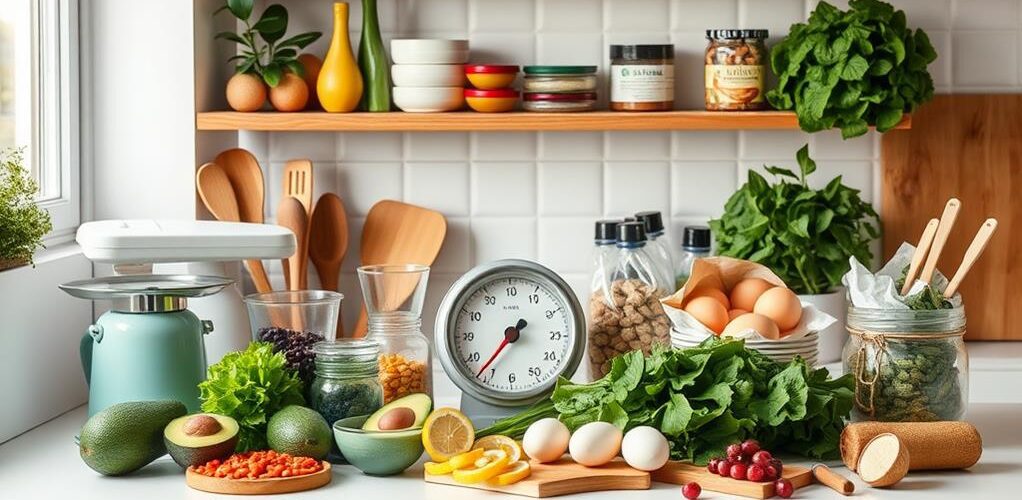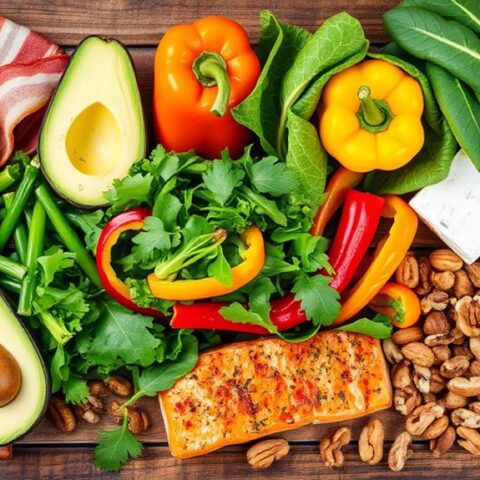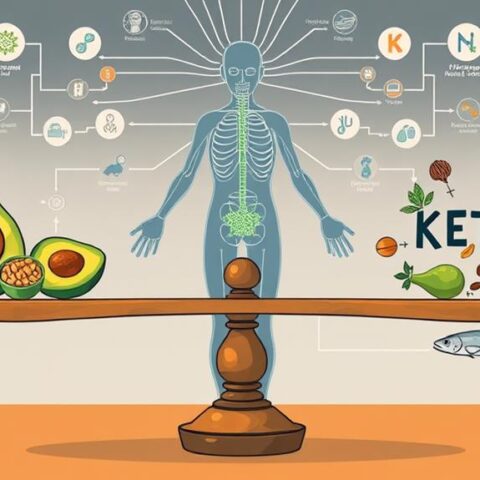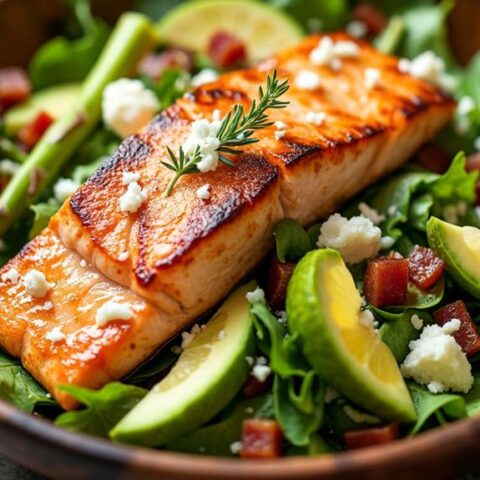
Starting a keto diet can be exciting, but avoiding common mistakes is essential. First, watch your carbs—they sneak into sauces, sides, and even drinks, easily tipping you over the daily limit. Second, don't overload on protein; too much can actually turn into sugar, kicking you out of ketosis. Third, neglecting electrolytes can lead to the dreaded keto flu, so load up on sodium, potassium, and magnesium. Fourth, poor meal prep can make you grab high-carb snacks out of desperation. Finally, never ignore food quality; choose nutrient-rich foods over processed junk. Stick with these tips, and you'll be on the right path!
Key Takeaways
- Exceeding Carb Limits: Stay below 50 grams of net carbs daily and watch out for hidden carbs in sauces, dressings, and processed foods.
- Overeating Protein: Limit protein intake to 0.7-0.9 grams per pound of lean body mass to avoid glucose conversion.
- Neglecting Electrolytes: Ensure daily intake of 3,000 to 5,000 mg of sodium and consume potassium and magnesium-rich foods like avocados and spinach.
- Skipping Meal Prep: Prepare weekly keto-friendly meals in advance to avoid impulsive high-carb choices and simplify macronutrient tracking.
- Ignoring Food Quality: Choose nutrient-dense foods and high-quality fats over processed snacks to support overall health and long-term keto success.
Excessive Carbohydrate Intake
One of the most common pitfalls on the ketogenic diet is excessive carbohydrate intake, which can thwart the body's ability to enter and maintain ketosis. To stay in ketosis, you need to keep your daily carbs below 50 grams. Sounds simple, right?
But hidden carbs can sneak in from places you least expect, like sauces, dressings, and processed foods. These sneaky carbs can quickly add up and push you over your limit without you even realizing it.
Understanding "net carbs" is also essential. Net carbs are total carbs minus fiber and certain sugar alcohols. If you don't subtract these correctly, you might think you're within your limit but end up consuming more carbs than intended. It's like thinking you're acing a test only to find out you misread half the questions!
Alcohol is another tricky area. Many alcoholic drinks contain carbs that people often overlook. A couple of beers or a sweet cocktail can throw off your entire carb count for the day.
Overconsumption of Protein
While managing carbohydrate intake is paramount to maintaining ketosis, overconsumption of protein can similarly disrupt the ketogenic process. Eating too much protein can lead to gluconeogenesis, a process where your body turns protein into glucose. This can mess up your fat-burning goals and knock you right out of ketosis.
Many beginners think high-protein foods are their main energy source on a keto diet. But actually, healthy fats should be your focus. The recommended protein intake for keto dieters is usually 0.7-0.9 grams per pound of lean body mass. Going beyond this can stop your weight loss progress. Tracking your protein intake is essential. If protein makes up 30% or more of your total calories, you might get booted out of ketosis. Aim for 20-25% instead.
Watch your protein sources, too. Relying too much on bacon and processed meats can cause nutrient imbalances and health issues. Instead, mix in a variety of nutrient-dense, low-carb foods.
Also, think about protein timing. Spreading your protein intake evenly throughout the day can help maintain steady energy levels and support muscle repair without overloading your system at once.
Neglecting Electrolytes
Neglecting electrolytes can greatly hinder your success on a ketogenic diet.
When you reduce your carb intake, your body loses more sodium and potassium, which can lead to unpleasant "keto flu" symptoms like headaches, fatigue, and muscle cramps.
To avoid these pitfalls, maintaining electrolyte balance and proper hydration strategies is vital.
Here are four key tips to help you stay on track:
- Increase Sodium Intake: Aim for 3,000 to 5,000 mg of sodium daily. Salting your food and incorporating high-sodium options like broth can help you achieve this.
- Boost Potassium and Magnesium: Foods like avocados, spinach, and nuts are rich in these significant electrolytes. Including them in your diet can alleviate symptoms related to deficiencies.
- Stay Hydrated: Drink at least 64 ounces (8-10 cups) of water daily. Increased urination on a low-carb diet can lead to dehydration, so keeping up with water intake is vital.
- Monitor Electrolyte Levels: Regularly check for signs of deficiencies and adjust your diet or supplements accordingly to support overall health during keto adaptation.
Poor Meal Preparation
Maintaining electrolyte balance is critical, but equally important is guaranteeing proper meal preparation. Skipping meal prep can lead to impulsive food choices, like grabbing that tempting high-carb snack, and suddenly, your ketosis efforts are out the window.
Without planning meals in advance, you might end up relying on convenience foods loaded with hidden sugars and unhealthy fats. You know that's a one-way ticket to keto failure.
So, what's the game plan? Let's talk meal prep strategies and batch cooking tips. First, set aside time each week for meal prepping. Cook large batches of keto-friendly staples like grilled chicken, cauliflower rice, and leafy greens.
Store them in portioned containers so you can grab and go. This makes sticking to your dietary goals a breeze, reducing stress and saving time.
Tracking your macronutrient ratios becomes a cinch when you have prepped meals. You'll hit those low-carb targets without even breaking a sweat!
Proper meal prep guarantees you always have nutrient-dense, low-carb foods on hand, making it easier to maintain ketosis and avoid any sneaky carbs. Remember, failing to plan is planning to fail, so get those meals prepped and stay on track!
Ignoring Food Quality
Prioritizing food quality is paramount when adhering to a ketogenic diet, as it directly impacts your overall health and long-term success. Many people make the mistake of focusing only on low-carb options without thinking about the quality of the food they're eating. This can lead to nutritional deficiencies, as processed keto foods often lack essential vitamins and minerals.
Here are some key points to keep in mind:
- Nutrient Density: Choose foods that are rich in nutrients. Leafy greens, low-carb fruits, and vegetables are packed with vitamins and minerals that support overall health and well-being.
- Healthy Fats: Prioritize high-quality fats from sources like avocados, grass-fed meats, and olive oil. These fats are not only beneficial for your health but also help guarantee you're getting enough nutrients.
- Avoid "Dirty Keto": Consuming processed foods high in inflammatory oils can undermine your health. These foods might be low in carbs, but they can lead to long-term issues like obesity and inflammation.
- Limit Processed Snacks: While convenient, low-quality, processed snacks often contain hidden sugars and unhealthy additives. These can hinder weight loss efforts and negatively impact digestion.
Frequently Asked Questions
What Are Big Mistakes on Keto?
Common pitfalls in keto dieting include underestimating carbohydrate limits, overconsuming protein, neglecting electrolyte balance, relying on processed foods, and failing to track intake accurately. Addressing these keto misconceptions is essential for achieving and maintaining ketosis effectively.
What Are the Do's and Don'ts of Keto Diet?
Effective keto meal planning is essential. Key do's include tracking macronutrients and staying hydrated, while avoiding common misconceptions like hidden carbs and over-reliance on processed foods. Prioritize whole foods and advance meal preparation for sustained success.
What Foods Can You Eat Unlimited Amounts of on Keto?
On a keto diet, you can consume unlimited amounts of low carb vegetables like spinach, kale, and broccoli. Additionally, keto friendly snacks such as avocados and herbs like basil and cilantro can be enjoyed freely.
Does Drinking Water Speed up Ketosis?
While water intake does not directly induce ketosis, proper hydration benefits the process by aiding kidney function, managing appetite, and supporting overall metabolic processes, thereby optimizing the shift to burning fat for fuel.
Conclusion
In summary, common pitfalls in the keto diet include excessive carbohydrate intake, overconsumption of protein, neglecting electrolytes, poor meal preparation, and ignoring food quality. To achieve ideal results, it is essential to maintain strict control over carbohydrate and protein consumption, guarantee adequate electrolyte intake, plan meals effectively, and prioritize the quality of food consumed. By addressing these issues, individuals can enhance their adherence to the keto diet and improve overall health outcomes.









No Comments